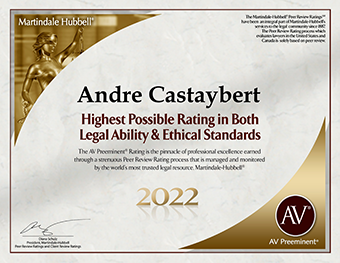- New York offers a great number of arbitrators and advocates with extensive experience in complex commercial matters in both domestic and international settings.
- New York attorneys are familiar with cross-cultural perspectives and industry practices and customs.
- Many attorneys, such as André Castaybert of Castaybert PLLC, are bilingual or multilingual. (Mr. Castaybert is fluent in French.)
- Most influential ADR institutions, such as the International Court of Arbitration, the International Centre for Dispute Resolution, and the CPR International Institute for Conflict Prevention and Resolution, are located in New York.
To learn more about international arbitrations in New York, check out the NYIAC website here.
To learn more about Castaybert PLLC’s arbitration practice, click here.







